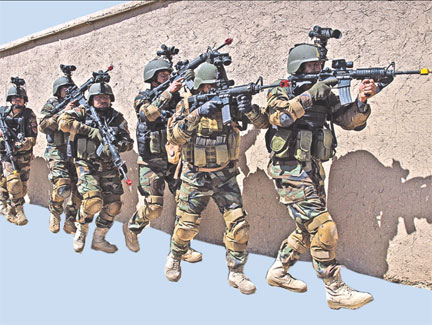LOCAL INFORMATIONis the stock-in-trade of NGOs
 Dr Kamal WICKREMASINGHE Dr Kamal WICKREMASINGHE
Recent moves to curb NGO activities by many developing countries, and
by Russia, is indicative of the fact that these countries have
established without doubt that the NGOs play an important, sinister role
as foot soldiers of Western foreign policy, particularly that of the US,
inimical to their national interests.
The NGOs play their role mainly through gathering and conveying
information on the local political climate through local embassies. They
also receive foreign funding for the explicitly political and disruptive
function of rallying citizens of developing countries to challenge
elected governments under the guise of ‘protesting’ against specific
policies or initiatives.
|

US troops in Afghanistan |
The utilisation of NGOs as a foreign policy tool by Western
intelligence agencies began in the 1990s during the push for
globalisation, gathering momentum following the reform of intelligence
culture in the US and Europe following the September 11 affair.
The criticism of the CIA and other US intelligence organisations in
the 9/11 Commission Report for adhering to Cold War methodologies of
technical intelligence gathering methods such as imagery intelligence
and signal intelligence at the expense of human intelligence (HUMINT)
directed the US intelligence structures to further expand their joint
venture with the NGOs. In combination with criminal networks and Ethnic
diasporas, (NGOs) became the new HUMINT infrastructure.
Today NGOs work in association with the CIA, USAID and the US
military in target countries, in crisis zones, and following natural
disasters the world over to help achieve the neocon generated agenda of
geopolitical objectives.
An NGO operative with a satellite phone in hand, and access to other
modern communication facilities can instantly provide essential
information to Washington these days, replacing months of compilation
and analysis that would have been necessary previously.
The ‘outsourcing’ of the intelligence business to NGOs has changed
the ‘intelligence culture’ fundamentally: the traditional ‘spy’ has
become a handler of NGO staff on the ground, rarely having to leave the
safety of embassy precincts; The role of the government ‘analyst’ has
become one of integrating NGO source material into the mix of
information from the embassies and the military.
The ‘business’ has made NGOs an important economic player on a global
scale, currently accounting for over 5 percent of the gross domestic
product and over 4 percent of global employment. The rise of the NGO
movement since the 1990s can be solely attributed to the variety of
tasks they carried out as tools of Western intelligence agencies.
NGOs are a cheap method of intelligence gathering
The NGOs have become a much cheaper and safer option for information
gathering in target countries and in conflict and post-conflict
situations where most Western governments would have few ‘assets’ on the
ground. NGOs on the other hand would have had either long term residence
through ‘false flag’ activities such as corruption prevention and
capacity building, and in conflict scenarios,‘helping’ displaced people.
|

TERRORIST ATTACK on World Trade Centre in 2001 |
Some NGO workers are indeed country experts with useful regional
insights acquired by virtue of extended deployments, and others are
generalists with geographic expertise. The lack of analytical skills
among NGO workers is addressed by the involvement of US government
analytic cadres, who are professionals with expertise in the field.
NGOs’ ability to obtain information in the countries they operate in,
and convey such information to US authorities has improved with the
advance and spread of information technology. The availability of NGO
workers conversant in the local language and familiar with the local
health medical and environmental conditions obviate the need to train
and acclimatise new intelligence officials, reducing the costs
considerably.
Most importantly, local populations oblivious to their stealthy
intelligence gathering function consider NGO staff politically
acceptable, helping overcome the ‘bad press’ the US has had received the
world over.
The increasing association of NGOs with intelligence agencies has
enabled them to rely less on private donations and to receive more and
more funding from USAID’s Office of Foreign Disaster Assistance (OFDA)
and other government funding sources. World Vision, the largest US NGO
with annual revenues of $700 million — and Oxfam-US, receive nearly half
of their revenue from the government. Groups such as the International
Medical Corps receive about 80 percent of their funding from government
sources.
A well streamlined modus operandi
The processes required to transform the office based government
preserve of intelligence gathering and analysis is now complete: the
information collection from NGOs happens primarily through the State
Department’s Bureau of Intelligence and Research, through diplomatic
exchanges and USAID. The Defence Intelligence Agency directly supports
US Armed Forces on the ground with the finished product.
An Internal intelligence community agreement known as the Concepts of
Operation (ConOps), designed for the duration of a particular
taskorcrisis, sets forth the agreed procedures for joint ventures with
NGOs. A lead agency is identified to manage the ConOps including the
relationship with NGOs.The coordination of activities of hundreds of
NGOs headquartered in the US alone is done through umbrella
organisations such as Interaction which serves as the NGO clearing
house, through meetings aimed at regular sharing and pooling of
information from the field.
NGOs, by necessity, camouflage themselves in the field in numerous
ways, and to varying degrees, especially during conflict and
post-conflict situations:some, such as Medecins sans Frontieres and the
International Red Cross make it a point to remind the public that they
serve a completely apolitical set of objectives and do not openly
interact with foreign governmental groups in the same area.
Other NGOs such as CARE, World Vision, Mercy Corps, and Save the
Children maintain extensive contact with their sponsoring governments
while being careful to publicly distinguish their presence from that of
their government.
Groups such as International Medical Corps and the new evangelical,
faith-based NGOs portray themselves without hesitation as implementers
of ‘people-to-people’ policies and programmes decided and funded by the
wealthy nations for the relieving suffering in developing countries in
crisis.
NGOs themselves are now becoming experts in the intelligence
business
The NGOs have been showing signs of ‘warming up’ to the function of
intelligence gathering over the last decade or so, mostly in the area of
generating information useful for US military deployments in the
developing world.
The International Crisis Group (ICG), founded in 1995 by a group
including Fred Cuny, an 'international disaster relief specialist' who
disappeared in Chechnya in 1995, to 'prevent and resolve deadly crisis'
now has over 100 staff members on five continents carrying out
field-based political analyses. ICG analytical reports have become
sought after by governments considering troop deployments in crisis
zones.
The American group Vietnam Veterans of America Foundation(VVAF)
developed iMMAP (Information Management and Mine Action Programmes), an
information hub for data relating to the locations of landmines, with a
view to protect US Forces from ‘surprises’ in foreign lands.
Collaboration between NGOs at headquarters level and in the field has
been another development in the direction of dealing with governments as
‘equals’ in the intelligence business. Integrated Regional Information
Networks (IRIN), with offices in countries like the Ivory Coast, South
Africa, Pakistan, and New York, provides universal, real-time access to
strategic information from humanitarian operations in remote regions.
Relief Web is another such USAID funded operation, an electronic
gateway to documents and maps from government, academic, and NGO
sources, on humanitarian emergencies and disasters. It boasts a database
with over 500,000 maps and documents dating back to 1981.
Humanitarian Information Centres(HIC) that focuses on maps and other
“actionable data”, that began in 1999 in Kosovo was adapted later for
use in Eritrea, Afghanistan, Palestine, Iraq, and Liberia. It provides
Geographic Information Systems and 'internet café' services for
humanitarian workers. There are numerous other Web-based information
provider services run by NGOs with funding from the UN, USAID, and other
Western governments.
The relationship has had its ups and downs
The fast expanding intelligence-based relationship between NGOs and
the CIA, USAID, and the Department of State has not been without
ructions: some in the NGO community have questioned the moral and
ethical dilemmas of cooperating with US troops in 'wars of choice' such
as Iraq and Afghanistan. Others have complained that the intelligence
flow is one-way, with the US government sharing only information that
has already been in the news but get the NGOs to do the risky work.
The disagreements peaked during the Iraqi invasion in 2003, and as a
payback, the Bush administration’s director of USAID demanded that NGOs
identify their activities in Afghanistan as funded by the US government
and a Web site designed to monitor NGOs for their alleged liberal bias
and unwillingness to adhere to current policy preferences was launched.
Afghanistan also gave rise to other grounds of NGO complaints due to US
analysts not sharing information on military plans or presence with
NGOs, due to fears that the information could be misused by local
civilian staff of NGOs.
The introduction of the Partner Vetting System (PVS) that required
NGOs receiving funding from the State Department or USAID to collect
information on their host country employees and partners for screening
against secret terrorist databases was another bone of contention, due
to the potential for local employees turning hostile against their NGO
masters.
The 2004 Tsunami relief work, a purely humanitarian crisis not
fraught with the political dimensions that many post-conflict situations
entail, restored the relationship. In recent years, the National
Intelligence Council has begun providing NGOs directly with information
such as estimates of anticipated complex humanitarian needs.
Boundaries between the US government and NGOs are fast erasing
The trend of close links between NGOs and US and European government
organisations in target countries is on the rise. Essentially, NGOs and
government groups are partners in these operations.
The disappearance of boundaries between the NGOs and the US
government is reflected in the increasing numbers of former military
officers, former ambassadors, and retired government officials moving
into the NGO sector. The appointment in January 2012 of Suzanne Nossel
as Executive Director of Amnesty International (AA), always a key tool
in the imperial toolbox, was a glaring example of this phenomenon.
Prior to the AA job, Nossel, known for coining the phrase ‘smart
power’ which she defined as “the ability to obtain the outcomes one
wants through attraction rather than using the carrots and sticks of
payment or coercion” was Deputy Assistant Secretary for International
Organisations at the US Department of State: a case of the NGO ‘game
keeper’ choosing to join the ranks herself!
It is revealed in ‘The Command: ‘Deep Inside the President’s Secret
Army’ by D.B Grady and Marc Ambinder, that members of the Joint Special
Operations Command (JSOC) counter-terrorism units credited with
capturing or killing many of the most wanted terrorists, including Osama
bin Laden,entered into Pakistan posing as aid workers following the 2005
Kashmir earthquake, escaping the requisite background checks from
Pakistan’s Inter-Services Intelligence (ISI) agency. What the foregoing
account shows is that the mushrooming and growth of NGOs has been the
direct result of Western governments funding with a view to ‘exploit’
them to perform services and tasks previously implemented by soldiers
and civil servants.
The interdependence of the dark neocon world of rule-by-intelligence
and the NGOs is growing. The need for vigilance by targeted developing
country governments such as Sri Lanka is greater than ever. |







